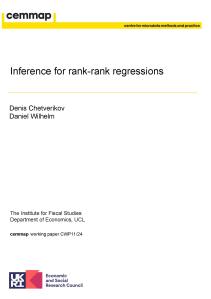<p><p>We propose a method for modifying a given density forecast in a way that incorporates the information contained in theory-based moment conditions. An example is 'improving' the forecasts from atheoretical econometric models, such as factor models or Bayesian VARs, by ensuring that they satisfy theoretical restrictions given for example by Euler equations or Taylor rules. The method yields a new density (and thus point-) forecast which has a simple and convenient analytical expression and which by construction satisfies the theoretical restrictions. The method is flexible and can be used in the realistic situation in which economic theory does not specify a likelihood for the variables of interest, and thus cannot be readily used for forecasting. </p></p>
Authors

Research Associate University College London
Raffaella is a Professor in the Department of Economics at UCL and a Senior Economist at the Federal Reserve Bank of Chicago.

Giuseppe Ragusa
Report details
- Publisher
- CEPR
Suggested citation
Giacomini, R and Ragusa, G. (2011). Incorporating theoretical restrictions into forecasting by projection methods. London: CEPR. Available at: https://ifs.org.uk/publications/incorporating-theoretical-restrictions-forecasting-projection-methods (accessed: 30 June 2024).
Related documents
More from IFS
Understand this issue

Gender norms, violence and adolescent girls’ trajectories: Evidence from India
24 October 2022

What are the challenges in getting debt on a falling path?
28 June 2024

What is the two-child limit in benefits?
27 June 2024
Policy analysis

ABC of SV: Limited Information Likelihood Inference in Stochastic Volatility Jump-Diffusion Models
We develop novel methods for estimation and filtering of continuous-time models with stochastic volatility and jumps using so-called Approximate Bayesian Compu- tation which build likelihoods based on limited information.
12 August 2014

Assessing the economic benefits of education: reconciling microeconomic and macroeconomic approaches
This CAYT report discusses the strengths and limitations of several approaches to assessing the effect of education on productivity.
14 March 2013

Misreported schooling, multiple measures and returns to educational qualifications
We provide a number of contributions of policy, practical and methodological interest to the study of the returns to educational qualifications in the presence of misreporting.
1 February 2012
Academic research

Inference for rank-rank regressions
28 May 2024

Understanding Society: minimising selection biases in data collection using mobile apps
2 February 2024

The impact of labour demand shocks when occupational labour supplies are heterogeneous
28 June 2024